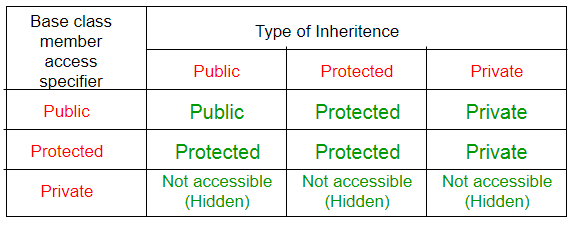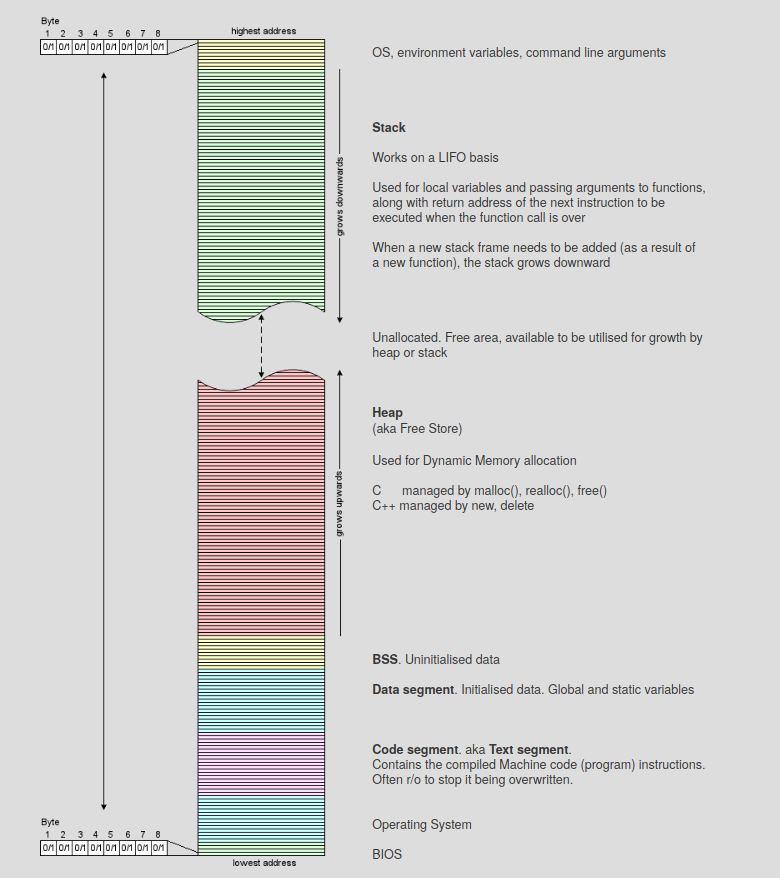C++ Notes | Tech
by Saumya Shah
Object Oriented Programming:
Basic concepts in Object Oriented Programming:
- Classes: Blueprint
- Object: An instance of the class
- Encapsulation: Wrap up relevant information under units
- Abstraction: Reveal only what is necessary (Can be using classes or headers)
- Polymorphism: Same names, different purposes (overloading)
- Inheritance: Reuse what can be reused, inherit from parent
Access Modifiers:
- Public: They can be accessed by everyone.
#include <bits/stdc++.h>
using namespace std;
class Demo
{
// Access specifier
public:
// Data Members
string name;
// Member Functions()
void printname()
{
cout << "Demo name is: " << name;
}
};
The function can be declared in the class and defined outside or in another file using scope resolution like so.
#include <bits/stdc++.h>
using namespace std;
class Demo
{
// Access specifier
public:
// Data Members
string name;
// Member Functions()
void printname();
};
Demo::printname()
{
cout << "Demo name is: " << name;
}
- Private: Can only be accessed inside the class. Only member functions can access the private variables with exception of friend class. The code below would give compiler error as we try to access the private member outside the class.
#include<iostream>
using namespace std;
class Circle
{
// private data member
private:
double radius;
// public member function
public:
double compute_area()
{ // member function can access private
// data member radius
return 3.14*radius*radius;
}
};
// main function
int main()
{
// creating object of the class
Circle obj;
// trying to access private data member
// directly outside the class
obj.radius = 1.5;
cout << "Area is:" << obj.compute_area();
return 0;
}
- Protected : Similar to private, but can be accessed by the sub-class which inherits it.
class Parent
{
// protected data members
protected:
int id_protected;
};
// sub class or derived class
class Child : public Parent
{
public:
void setId(int id)
{
// Child class is able to access the inherited
// protected data members of base class
id_protected = id;
}
void displayId()
{
cout << "id_protected is: " << id_protected << endl;
}
};
Constructors and Destructors
These are methods with same name as that of the class, and are called whenever an object is created. Similarly, distructors are called when the object goes out of scope or is deleted.
#include <bits/stdc++.h>
using namespace std;
class Demo
{
public:
int id;
//Default Constructor
Demo()
{
cout << "Default Constructor called" << endl;
id=-1;
}
//Parametrized Constructor
Demo(int x)
{
cout << "Parametrized Constructor called" << endl;
id=x;
}
//Destructor
~Demo()
{
cout << "Destructor called for id: " << id <<endl;
}
};
Inheritance
The class can be inherited into another class which can use its properties, this makes it easy to reuse the code. The inheriting class is Child or sub class and the other is parent or base class or super class.
#include <bits/stdc++.h>
using namespace std;
//Base class
class Parent
{
public:
int id_p;
};
// Sub class inheriting from Base Class(Parent)
class Child : public Parent
{
public:
int id_c;
};
//main function
int main()
{
Child obj1;
// An object of class child has all data members
// and member functions of class parent
obj1.id_c = 7;
obj1.id_p = 91;
cout << "Child id is " << obj1.id_c << endl;
cout << "Parent id is " << obj1.id_p << endl;
return 0;
}
Notice that the class was inherited as public. The image below captures most of what you need to know:

Polymorphism
- Compile time:
- Function overloading
#include <bits/stdc++.h>
using namespace std;
class Geeks
{
public:
// function with 1 int parameter
void func(int x)
{
cout << "value of x is " << x << endl;
}
// function with same name but 1 double parameter
void func(double x)
{
cout << "value of x is " << x << endl;
}
// function with same name and 2 int parameters
void func(int x, int y)
{
cout << "value of x and y is " << x << ", " << y << endl;
}
};
2. Operator overloading
#include<iostream>
using namespace std;
class Complex {
private:
int real, imag;
public:
Complex(int r = 0, int i =0) {real = r; imag = i;}
// This is automatically called when '+' is used with
// between two Complex objects
Complex operator + (Complex const &obj) {
Complex res;
res.real = real + obj.real;
res.imag = imag + obj.imag;
return res;
}
void print() { cout << real << " + i" << imag << endl; }
};
- Run time
Function Overriding : This can override the base class methods which are defined virtual. This happens at the run time, bptr points to the derived object address but it cannot access any members that are not in the base class. Pointing it to a derived class address only overrides the virtual methods
#include <bits/stdc++.h>
using namespace std;
class base
{
public:
virtual void print ()
{ cout<< "print base class" <<endl; }
void show ()
{ cout<< "show base class" <<endl; }
};
class derived:public base
{
public:
void print () //print () is already virtual function in derived class, we could also declared as virtual void print () explicitly
{ cout<< "print derived class" <<endl; }
void show ()
{ cout<< "show derived class" <<endl; }
};
//main function
int main()
{
base *bptr;
derived d;
bptr = &d;
//virtual function, binded at runtime (Runtime polymorphism)
bptr->print();
// Non-virtual function, binded at compile time
bptr->show();
return 0;
}
- More info here
Structure vs Class
- In class, members are private by default, and in structure, they are public by default. Class:
#include <stdio.h>
class Test {
int x; // x is private
};
int main()
{
Test t;
t.x = 20; // compiler error because x is private
getchar();
return 0;
}
Struct:
#include <stdio.h>
struct Test {
int x; // x is public
};
int main()
{
Test t;
t.x = 20; // works fine because x is public
getchar();
return 0;
}
- While inheriting, default access specifiers are public in struct and private in classes.
Static Members
- They must be defined outside the class. They also cannot be accessed without a definition.
- The code below only calls the constructor of B, because A is not defined.
#include <iostream>
using namespace std;
class A
{
public:
A() { cout << "A's Constructor Called " << endl; }
};
class B
{
static A a;
public:
B() { cout << "B's Constructor Called " << endl; }
};
int main()
{
B b;
return 0;
}
- The code below throws error because ‘a’ is not defined.
#include <iostream>
using namespace std;
class A
{
int x;
public:
A() { cout << "A's constructor called " << endl; }
};
class B
{
static A a;
public:
B() { cout << "B's constructor called " << endl; }
static A getA() { return a; }
};
int main()
{
B b;
A a = b.getA();
return 0;
}
- The program below calls B’s constructor thrice but A’s only once. Because static members are shared.
#include <iostream>
using namespace std;
class A
{
int x;
public:
A() { cout << "A's constructor called " << endl; }
};
class B
{
static A a;
public:
B() { cout << "B's constructor called " << endl; }
static A getA() { return a; }
};
A B::a; // definition of a
int main()
{
B b1, b2, b3;
A a = b1.getA();
return 0;
}
Friend
- Class: A friend class can access private and protected members of the other class.
class Node {
private:
int key;
Node* next;
/* Other members of Node Class */
// Now class LinkedList can
// access private members of Node
friend class LinkedList;
};
- Function: A friend function can similarly access private and protected members of the other class.
class Node {
private:
int key;
Node* next;
/* Other members of Node Class */
friend int LinkedList::search();
// Only search() of linkedList
// can access internal members
};
- Example for syntax and usage:
#include <iostream>
class A {
private:
int a;
public:
A() { a = 0; }
friend class B; // Friend Class
};
class B {
private:
int b;
public:
void showA(A& x)
{
// Since B is friend of A, it can access
// private members of A
std::cout << "A::a=" << x.a;
}
};
- Friendship is not mutual and not inherited.
- More info [here]((https://www.geeksforgeeks.org/friend-class-function-cpp/)
Abstract Classes and Pure Virtual Functions
- Abstract class is the class with at least one pure virtual function. We cannot create objects of abstract class. It serves as a basic framework for deriving other classes. If derived class doesn’t override virtual function, it is also abstract.
- Pure virtual function is a virtual function with no definition, only declaration. It is declared as:
// An abstract class
class Test
{
// Data members of class
public:
// Pure Virtual Function
virtual void show() = 0; //Notice, no declaration using '{ }'
/* Other members */
};
Memory Allocation
- Used for allocating memory of variable sizes, which cannot be done by compiler (except variable size arrays)
- We can allocate and deallocate at our will
Memory Layout

New and delete
When dynamically allocating, HEAP memory is assigned. new <class name> returns a pointer type to allocated memory of that class instance.
int *p = NULL;
p = new int;
//OR
int *p = new int;
You can also initialize it as: pointer-variable = new data-type(value);
int *p = new int(25);
float *q = new float(75.25);
Or assign a block of memory as : pointer-variable = new data-type[size];
int *p = new int[10] //Can be accessed as p[0],p[1],...
Finally, you can delete it simple by: delete <pointer variable name>; (or a variable) and delete[] <pointer variable name>; for a block
Miscellaneous
- Sizes of Classes
- Templates (Specifically for syntax and definition in cpp file FAQ)
- When having a member of the Class type, remember this
- Using const:
struct X
{
void foo() const // <== The implicit "this" pointer is const-qualified!
{
_x = 42; // ERROR! The "this" pointer is implicitly const
_y = 42; // OK (_y is mutable)
}
void bar(X& obj) const // <== The implicit "this" pointer is const-qualified!
{
obj._x = 42; // OK! obj is a reference to non-const
_x = 42; // ERROR! The "this" pointer is implicitly const
}
void bar(X const& obj) // <== The implicit "this" pointer is NOT const-qualified!
{
obj._x = 42; // ERROR! obj is a reference to const
obj._y = 42; // OK! obj is a reference to const, but _y is mutable
_x = 42; // OK! The "this" pointer is implicitly non-const
}
int _x;
mutable int _y;
};
-
Brace Initializers:
https://www.modernescpp.com/index.php/initialization ,
https://www.youtube.com/watch?v=SmriQ5zXeAk ,
https://stackoverflow.com/questions/18222926/why-is-list-initialization-using-curly-braces-better-than-the-alternatives
- Threads:
http://jakascorner.com/blog/page2/
- Referencing and Dereferencing and more:
https://stackoverflow.com/questions/22368300/what-does-this-return-exactly
Tips and common bugs:
- Semicolon at the end of class definition
- Static members are only declared in class declaration, not defined. They must be explicitly defined outside the class using scope resolution operator.
- Static members/variables are only initialized once. They have scope till the life time. The values are reused later. Also, if their address is accessed, they can be global in scope. Interesting example below. More info here and here.
#include <iostream>
#include <string>
using namespace std;
int * demo()
{
// static variable
static int count = 0;
cout << count << " ";
// value is updated and
// will be carried to next
// function calls
count++;
return &count;
}
int main()
{ int * p;
for (int i=0; i<5; i++) {
p = demo();
cout<<*p<<"lol";}
return 0;
}
References:
- geeksforgeeks.org
- https://cpp.tech-academy.co.uk/memory-layout/
